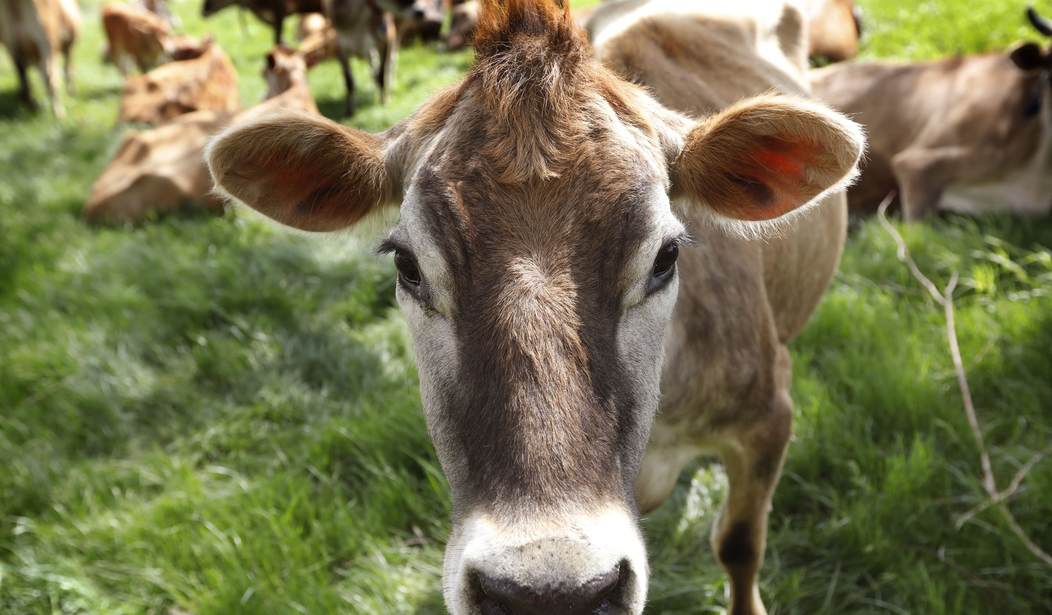Having grown up around livestock, I'm pretty familiar with their... emissions. Working summers in my uncle's livestock auction barn saw me shoveling some of those emissions, and dealing with the olfactory effluvium of other emissions. Cattle in particular are generous with their emissions, which is why eastern Iowa farmers back when/where I grew up often let their cattle out into freshly-combined corn fields, not only to glean waste corn from the ground but to spread fresh fertilizer.
It's an efficient practice, and if you're going to be anything, you should be efficient.
Cow emissions, specifically the gaseous ones, have become a common talking point among climate scolds. Now CNN, in a recent piece, has called for a cow flatulence vaccine to combat climate change. There's a problem: As ClimateRealism's Linnea Lueken points out in an economics and policy column, that assertion has a lot in common with a cow's more solid emissions:
A recent CNN article, “How a ‘cow fart’ vaccine could help tackle climate change,” discusses a vaccine under development to be given to cows to reduce the amount of methane their digestive processes produce. The hope is that the vaccine will significantly reduce livestock emissions, thereby slowing down climate change. It won’t. Methane from livestock contributes little, if anything, to global warming. As a result, attempting to change these animals’ biological processes seems to carry risks far exceeding any possible benefits.
CNN explains that methane is produced as grass ferments in the rumen, and claims that it is more “potent” than carbon dioxide, but does admit that it is comparatively very short-lived in the atmosphere. The author, Jacapo Prisco, goes on to claim that “livestock accounts for about a third of human-related methane emissions, which are collectively responsible for about 30% of global warming.”
CNN's assertions, as usual on this topic, are (speaking of emissions) the purest of the sort of stuff one finds at the south end of a northbound bull.
In the first place, CNN engages in a little linguistic, lateral arabesque - something someone might call "lying," in obfuscating the difference between cow emissions and emissions of methane from all sources.
Here the CNN author either misunderstands claims made about methane, or is intentionally misleading readers. The author cites the International Energy Agency (IEA) as the source of his claim concerning livestock methane emissions. The IEA does say methane is estimated to be responsible for 30 percent of global warming, a point it admits is open to debate. What it does not say, however, is that livestock emissions of methane are responsible for 30 percent of warming, which is what Prisco’s claim implies. Livestock emissions are only a small part of methane emissions attributable to human causes, much less global methane emissions as a whole.
The IEA, we should also note, is all-in themselves with the climate scolds, which makes clarity on this topic all the more necessary - clarity CNN doesn't supply, and which most CNN readers won't look into on their own.
In the second place, cattle emissions, of any kind, play essentially no role in climate change:
Data from the EPA show that beef production only accounts for 2 percent of all greenhouse gas emissions in the U.S., with only part of that coming from methane from cows’ digestive processes. This is notable, especially since the United States produces more beef and veal than any other country. Agricultural crop production, in contrast, produces 10 percent of all U.S. greenhouse gas emissions. It is not unreasonable to assume the same is true for the rest of the world.
And, finally, methane is not a significant driver of atmospheric warming:
A recent paper written by physicists William Happer, Ph.D., of Princeton University and W. A. van Wijngaarden, Ph.D., of Toronto’s York University, explains that contrary to claims methane is some super-warmer in the atmosphere, “the contribution of methane to the annual increase in forcing is one tenth (30/300) that of carbon dioxide.” Based on that fact, the scientists conclude that “[p]roposals to place harsh restrictions on methane emissions because of warming fears are not justified by facts.”
CNN, to be fair, isn't the first leftist publication to start up in horror at the notion of bovine flatulence setting the planet ablaze. They certainly won't be the last. That's too bad, as they are missing any number of marks; there are some legitimate reasons to be concerned about cow emissions of every kind, especially when one trods upon them; climate change is a small worry next to the stuff that can get on one's boots in a pasture.
See Related: Trump Orders EPA Chief Lee Zeldin to Dismantle Joe Biden's Assault on Household Appliances
The thing about bovine digestive systems, emissions aside, is that they are amazingly efficient at the process of turning coarse vegetation like grasses into something tender, delicious, and admirably suited for human consumption: Beef. The climate scolds would have us give that all up, citing climate change caused by our cattle herds, while conspicuously not mentioning the great bison herds, 20 million strong, that once roamed the Great Plains producing emissions of their own and somehow not setting the world on fire. So let's consider cow emissions as no more than what they are - malodorous and occasionally requiring one to scrape off one's boots, but no more annoying than that--and a small price to pay for delicious, nutritious beef.
It's safe to say that, in their panic over cow flatulence, CNN is, shall we say, premature.
This seems appropriate.













